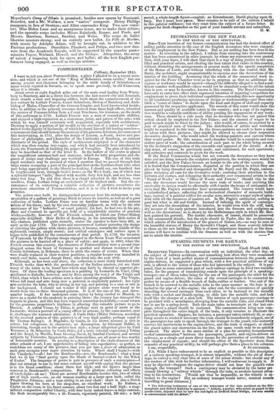SPEAKING-TRUMPETS FOR RAILWAYS.
TO THE EDITOR OF THE SPECTATOR.
Ninth Month 1845.
RESPECTED Fluarru—In conversation with an individual, the other day, on the subject of railway accidents, and remarking .how often they were occasioned by the want of a more perfect means of communication between the guards and engine-drivers, he suggested a plan which, with a few practical additions of my own, is offered to the notice of those who feel interested in the subject. It is pro- posed, that to some convenient part of each railway-carriage be fixed two metallic tubes, for the purpose of transmitting sounds upon the principle of a s trumpet; one of these tubes being for the use of the passengers, the other for the guard and engine-driver; the tubes of the several carriages to be connected to- gether by means of a flexible branch of India-rubber or leather. One end of the branch to be screwed to the metallic tube in the same manner as the hose is at- tached to the pipe of a fire-engine; the other end, for the convenience of quickly detaching the several carriages from each other, to be fastened to the metallic tube with a socket and thumb-spring, to slide into the metallic tube, and lock itself like the charger of a shot-belt. The interior of each passenger-carriage to be provided with a mouthpiece, diverging from the metallic tube, and closed when not in use by a spring-lever. Both the main tubes to terminate at the last car- riage, where a guard should be stationed. The communication being now com- plete throughout the entire length of the train, it only remains to illustrate the practical operation. Suppose, for instance, a passenger taken suddenly ill, or any- thing occurs to render it necessary the train should be immediately stopped, one of the passengers has only to speak through the trumpet to the guard, who instantly conveys his instructions to the engine-driver, and the train is stopped; or should the guard notice any obstruction on the line, the same result may be as quickly produced. The above is the mere outline of a plan for securing instantaneous verbal communication* between the passengers, guards, and engine-drivers on railways, as a simple and more direct means for the prevention of accidents than the employment of signals: and should the editor of the Spectator deem these remarks of any practical utility, he will perhaps give them a place in his columns.
P.S. While I have endeavoured to be as explicit as possible in this description of a railway speaking-trumpet, it is almost impossible, without the aid of draw- ings, to convey a very clear idea of some of the minor details: but should any of the readers of this wish for further information, I will endeavour to supply it. It may be objected—Suppose the engine-driver should not hear the guard's voice through the trumpet ? Such a contingency may be obviated by the latter pre viously blowing arailway whistle" through the tube, to awaken instant atten- tion to his instructions. [Would not that be impossible, as the whistle is at- tached to the engine ? But an ordinary trumpet would serve; musical sounds travelling to great distances.]
* The following testimony of one of the witnesses of the late accident on the Bk.. =Ingham and Bristol Railway is apropos—"Abbott, a porter, who acted as guard to the goods-train, deposed that he saw the red-light at Defford Road Bridge, but was moat* to ommunicate with the driver."


























 Previous page
Previous page